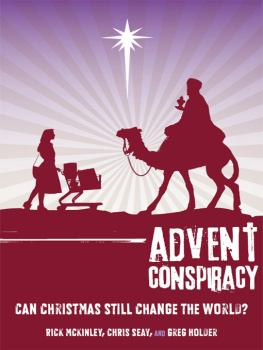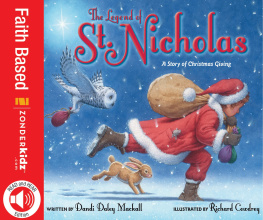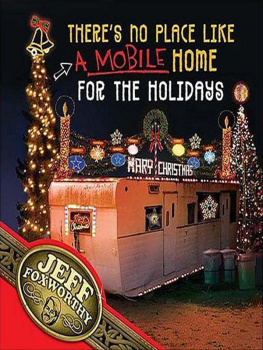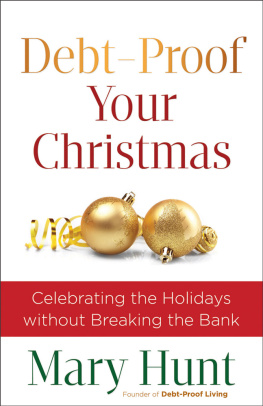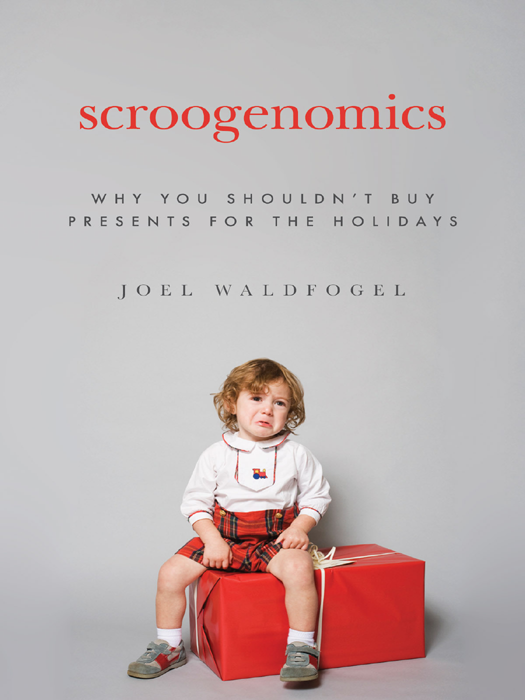Preface
I first encountered Christmas after my formal indoctrination as an economist. Where others see hearthside scenes of sharing, I also sawthrough the eyes of an economista large and organized institution for value destruction, hiding in plain sight but obscured for most people by their warm childhood memories.
I responded as any social scientist would. I started doing research. I surveyed my students about how much the gifts they received were worth to them, as well as how much the givers had paid. What I found is no surprise from the standpoint of economic theory: giftsthings that others buy for youare poorly matched with your preferences. As an institution for allocating resources (getting stuff to the right people), holiday giving is a complete loser. I wrote a little paper in 1993 called The Deadweight Loss of Christmas that set off a few alarms. Although I have a day job teaching and doing research on serious topics in economics, I have long indulged a habit of Yuletide research. A few years back I did some popular writing for Slate, and I found that I enjoyed communicating about research in ways that readers might find both informative and entertaining. What follows is my attempt to share my work on Yuletide economics with a broad audience.
I am grateful to my wife, Mary Benner, for supporting all of my endeavors, wacky or otherwise. I also thank Mary and her family for introducing me to Christmas but not disowning me despite the apparent fact that I am the most ungrateful son-in-law on the planet. I thank my father, Melvin, and my late mother, Gertrude, for raising me to deplore waste. Finally, I thank my children, Hannah and Sarah, for teaching me many things and, in particular, for their enthusiasm about the ideas for encouraging charitable giving at the holidays.
I wish you happyand efficientholidays.
CHAPTER ONE
Introduction
Every December brings the same nightmarish vision. It begins at a deserted mall stacked with a million dollars worth of products. Customers form a perimeter a thousand feet outside the mall. Then, out of nowhere, a red tornado strikesjust the mall and not the crowdand lifts the clothing and appliances and books and DVDs into the air. As quickly as the cyclone landed, it rises back up to the sky. Then the products rain gently down on the crowd.
Hey, I got a toaster, says someone in the crowd.
Look, I got a red sweater, not my size or color, says another.
Wow, I got a singing fish.
And these are the lucky ones.
Miraculously, no one is hurt, everyone gets something, and neither the building nor any of the products are damaged. But after the thrill of free stuff wears off, people realize that they do not have what they want.
I go around with a clipboard asking people in the crowd how much they would willingly have paid for what they got. A few got things they wanted, or now realize they want after reading the packaging. But most are unenthusiastic about their windfalls. They would not have been willing to pay anything close to the purchase price, if anything at all. When I tally the responses, people are willing to pay an average of twenty-five cents on the dollar of retail price.
Id like to say you can rest easy because these events never happened. But they did, and they do every year in much of the world. The red tornado is Santa Claus. And despite the warm feelings he evokes in children, his tornado of giving does a perennially poor job of matching stuff with people. In so doing, he destroys a lot of value, just as he turned our million dollars worth of products into a mere $250 thousand worth of satisfaction for the shoppers encircling the mall.
Every holiday season in the living rooms of families in rich countries we experience something similar to the red tornado, only without the actual funnel cloud. For months before the big day, mothers and fathersmothers, mostlyrun around trying to find the right gifts for their loved ones, young and old. Some gift recipients are easy to second-guess. It takes little imagination to predict that a four-year-old will like a doll or a toy truck. As kids get older, it gets tougher to find a surprise gift that theyll appreciate, but older kids often take out the guesswork with specific requests for this years fashionably conformist clothes. And then there are the adults for whom we are obliged to get something. We know that Uncle Jim and his wife and kids will be there, so we have to get him something. But what sort of music does your nephew like this year? Does his tongue piercing provide a clue? And grandmas coming. You have no idea what she wants, butbelieve meshe has even less of a clue about what you and your kids over seven want.
When the day arrives, familiesand extended familiesgather around a tree or a hearth or a menorah to exchange holiday gifts. Kids squeal in delight as they open their dolls and trucks. With young children especially, the gifts matter less than the ritual of ripping off wrapping paper and bows. Teenagers feign surprisefor grandmas benefitand register actual approval for the gifts they specifically requested. They roll their eyes at the music and movies you buy them. Because youve raised them well, they manage a smile for grandmas gifts. What kid doesnt need a candle? But the fabricated smiles arent limited to the teens. The adults all arrange their faces into expressions of pleasure as they unwrap items they would never buy for themselves. A cribbage board? You shouldnt have, we tell our mothers-in-law. Indeed.


